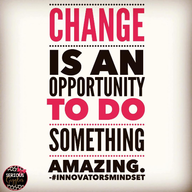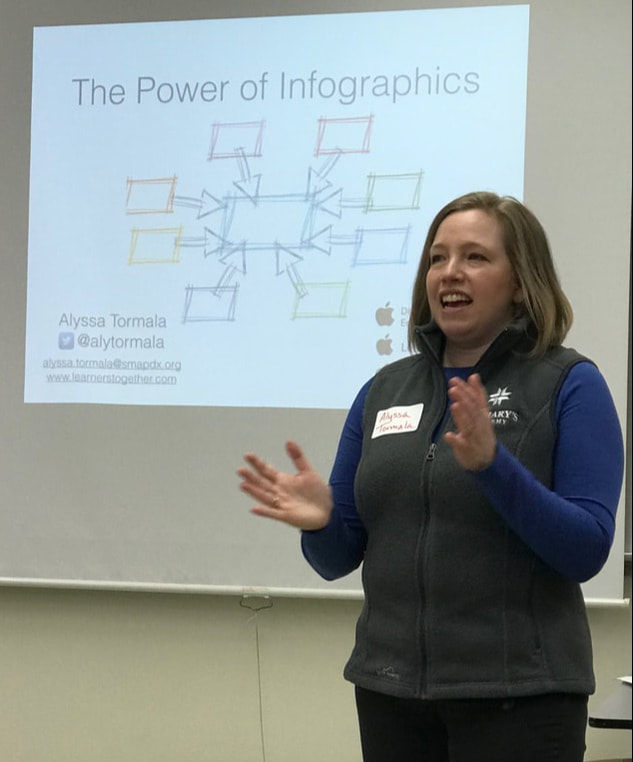 What a treat to listen to George Couros, Katie Martin, AJ Juliani, and John Spencer talk about design thinking and innovation in education during the first #IMMOOC event! Their discussion about taking risks and sharing learning hit home for me, especially their comments about fear being a main reason for risk aversion in education. No matter how innovative or enthusiastic we are, I think all of us worry about the potential consequences of stepping outside the safety zone. I’ve certainly had my fair share of blows. One of the hardest ones happened last year, and was, ironically, related to design thinking. I had just participated in a school-sponsored Design Challenge that was intended to help us ideate some options for a new library space. Inspired by that experience, I reframed the last unit of my high school speech class into a design challenge to give students a chance to design spaces for a new building we were in the process of developing. My students’ ideas impressed me so much that I asked our administrators to join us for their final presentations. But here’s the part of the story that I didn’t tell in my previous post. One of the administrators who watched the final presentations called me into her office the next day. I thought she wanted to talk about about the students’ ideas—after all, she had been the one to champion the design challenge I participated in. Instead, she told me that the presentation skills demonstrated by the students did not meet her expectations of what students should be able to do at the end of a speech class. The implication was that I had failed to teach my students what they were supposed to learn. I was left speechless (no pun intended) and crushed. She had completely missed the point of the exercise—which was not about giving a formal presentation. She passed judgement on an entire curriculum without asking a single question about it. And worse, she seemed to have completely missed the students’ ideas—I felt like I had let them down. What did I do? Well, I certainly wallowed in anger and hurt feelings for a while. I toyed with giving up on doing anything innovative. After all, if my ideas weren’t appreciated, then why bother? But then a friend helped me realize I had another option. I could look past what felt like an injustice and ask myself “What constructive feedback can I take from that conversation that would help me improve learning?” And as Martin put it in the #IMMOOC discussion, I could choose not to wait for permission to try again. The next semester, I ran another revised design challenge (take 2!) in my speech class. Included was a requirement that students formally present their ideas—this time with an expectation that they demonstrate the speaking skills I knew they had learned in the class. With much trepidation, I invited administrators and faculty to join us for the presentations. My worries came to nothing. Faculty and administrative feedback to the students was positive and encouraging. The students felt heard. And I felt validated in retaining design thinking as an experience in the class. As a coach, this experience was also invaluable. It helped me better understand the concerns that many of my colleagues feel about change and risk, and yet also encourage them to take those chances when it will help kids. So…change is absolutely a chance to do something amazing. But I think it’s also essential to recognize that the “amazing” part may come after a few stumbles or even flat out face-plants. Innovators like Couros, Martin, Juliani, and Spencer succeed not because they are just that awesome (which they are!) but because they don’t give up. And that’s something any of us can aspire to.
4 Comments
George Couros
2/28/2017 04:57:08 pm
You rock...this is why I focus on resiliency so much in the book. You will definitely face adversity if you try to do something different in pursuit of better, but the only people that succeed are the ones who don't stop.
Reply
Leslie Swanson
2/28/2017 05:12:40 pm
I appreciate you sharing your 'face plant' story, learning, and resiliency with us. It sounds like you are a very reflective teacher who strives to give your best to students. It is so important to have colleagues who help us see the big picture during those times we all have fallen head first. Kudos!
Reply
2/28/2017 05:27:06 pm
Great post! Glad you decided to give it another go and glad you had a sounding board in your friend. Sometimes it is so important to step back for our "failures" and reflect on the good and the bad and improve. It's what great teachers do! Teaching can be a lonely profession many times because often it's just you and your students and you don't have much time to talk with your colleagues but when you do, take advantage and share your ideas, frustrations and successes!
Reply
3/1/2017 06:54:25 am
Such a great reflection. I love that you went back and did not dwell on the negative. Good for you. We always learn something if we seek the constructive, rather than the negative.
Reply
Leave a Reply. |
Upcoming PresentationsPast
|
 RSS Feed
RSS Feed






